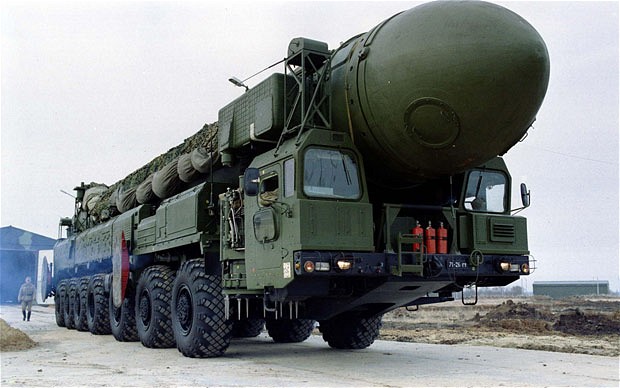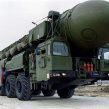
Obama’s Nuclear Cuts Initiative Meets Frosty Response in Moscow
Publication: Eurasia Daily Monitor Volume: 10 Issue: 117
By:

In a speech in Berlin this week (June 19), United States President Barack Obama called on Russia to jointly cut strategic nuclear weapons to 1,000 or fewer warheads for each. Under the 2010 “New START” or START III nuclear arms control treaty, both the US and Russia must by 2020 have reduced their stockpiles to, at most, 1,550 deployed strategic warheads attached to 700 deployed delivery systems (intercontinental ballistic missiles or ICBMs, strategic bombers and submarine launchers) with another 100 delivery systems in reserve. Obama also called for the reduction of US and Russian nonstrategic, or tactical, nuclear weapons, which had never been officially counted or limited by any international treaty. Today, Russia officially has 1,480 deployed strategic warheads and 492 deployed launchers (less than the START III limits), while the US has 1,654 deployed warheads and 792 deployed launchers. Russia plans to spend hundreds of billions of dollars to build and deploy new ICBMs and nuclear submarines to replace dilapidated Soviet systems, increase the number of deployed nuclear weapons and meet, by 2020, the START III limits. Obama’s disarmament initiative could help Russia reduce a costly nuclear rearmament program, but the reaction in Moscow was extremely frosty (RIA Novosti, June 19).
Deputy Prime Minister Dmitry Rogozin, a former nationalist maverick, today in charge of defense industrial production, compared the Obama administration with “the time of [Soviet leader Mikhail] Gorbachev, when reckless and foul treaties were signed, limiting the development of armaments that formed the backbone of our strategic potential.” Rogozin is convinced the Russian leadership will not take Obama’s disarmament initiative seriously. President Vladimir Putin’s influential foreign policy aide Yuri Ushakov acknowledged that Obama informed Putin during the Group of Eight (G8) summit in Northern Ireland earlier this week about his forthcoming disarmament initiative. According to Ushakov, the Kremlin demands that “other nuclear nations” (Britain, France and China) join the US and Russia in any new arms cuts (Interfax, June 19).
The Russian foreign ministry was more diplomatic in its language, but Obama’s initiative was still bluntly rejected. Foreign Minister Sergei Lavrov and his deputy Sergei Ryabkov stated they will study Obama’s proposals, while stipulating a number of preconditions to serious talks: “Other” nuclear powers must join the arms reduction; the START III treaty objectives must first be fully realized; the US must sign a comprehensive treaty limiting its ballistic missile defense (BMD) plans; and all US tactical nuclear weapons must be unconditionally removed from Europe and Turkey (RIA Novosti, June 20). The full execution of START III will come only in 2020; the US is not ready to impose any treaty limits on its future BMD plans; some NATO allies (Turkey) do not want the US to unilaterally withdraw the “double key” nuclear bombs deployed in Europe for use by allied aircraft in an event of war. China has reiterated that it believes the US and Russia must cut nuclear arsenals further (RIA Novosti, June 20). Other demands may be added, but those that Moscow already stated seem sufficient to propel Obama’s nuclear disarmament initiative to the domain of daydreams.
The Kremlin sees the US as its main enemy. Russia’s present massive rearmament program is aimed primarily to counter US military might. And anti-Americanism is a major propaganda pillar of the Putin regime (see EDM, June 13). The public relations effort to paint the US as an enemy while branding Russian human rights and pro-democracy activists as US agents is gathering momentum, and the Kremlin will not allow it to be undermined. According to a recent poll, 38 percent of Russians consider the United States an enemy—bypassing as Russia’s top foe Georgia and the Baltic States for the first time since the end of the Cold War. By contrast, only 5 percent consider China an enemy, while one in five see it as a friend (https://www.levada.ru/18-06-2013/vneshnepoliticheskie-vragi-i-druzya-rossii).
The Russian press touts the G8 summit in Northern Ireland as Putin’s personal diplomatic victory. In the run up to the summit, Canadian Prime Minister Stephen Harper publicly slammed Putin for supporting the “thugs of the Bashar al-Assad regime” and suggested Putin was not welcome anymore at G8 summits (“this is the G7 plus one”). In the end, Russia’s critics were silenced and Putin emerged triumphant in forcibly resisting Western pressure on Syria, telling journalists he never felt isolated. Putin insisted there is no evidence al-Assad used chemical weapons. The final G8 communiqué, which Russia signed together with the rest, did not attribute blame for chemical weapon use and did not call for the removal of al-Assad or anything else specific, carefully papering over any differences on Syria with Russia (Kommersant, June 19, 20).
If Washington believed Russia would respond to Western flexibility on Syria at the G8 with similar flexibility on nuclear disarmament, it seemed to have been mistaken. While Obama was speaking in Berlin, Putin in St. Petersburg was discussing plans of upgrading Russia’s defenses. Putin once again declared the 1987 US-USSR Intermediate-Range Nuclear Forces Treaty (INF), which eliminated intermediate-range and shorter-range nuclear missiles, a grave mistake: “The Americans do not need such weapons, while Russia today does.” Putin insisted: “We shall not allow the strategic balance [with the US] to be tilted, or allow our nuclear forces to lose their effectiveness.” Putin talked about the US “and other nations actively developing new offensive weapons” and preparing a “first, disarming and decapitating attack, even against nuclear nations,” that Russian military plans must take into account (https://news.kremlin.ru/news/18368/). A “decapitating attack” is seen in Russia as a US plan to build the capability to kill Putin and eliminate central Russian military command structures in a surprise blow, coming before a massive overall aggression begins. Russian military (General Staff) sources have told Jamestown that the US interceptor bases intended for Poland and Rumania essentially use BMD as a cover, while their main intent is to “decapitate Russia.”
In St. Petersburg, Putin promised to spend over $100 billion to develop air-space defenses and was shown new anti-aircraft/anti-missile interceptors including the S-300, S-400 and Vityz. According to Kommersant’s Kremlin press corps correspondent, this demonstration, coming the next day after the G8 summit, was significant and the S-300 missiles “may have been blessed by Putin for speedy delivery to Syria” (Kommersant, June 20). For now, at least, the INF treaty has not yet been scrapped after Putin’s meeting with Obama.




